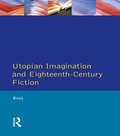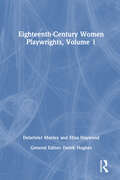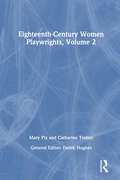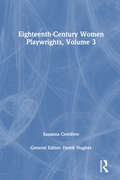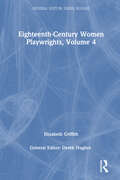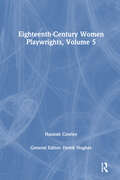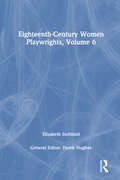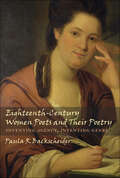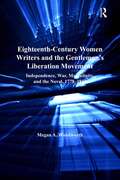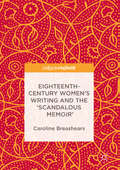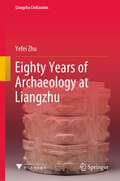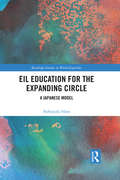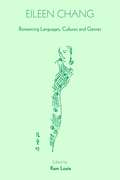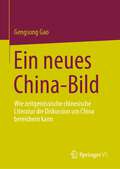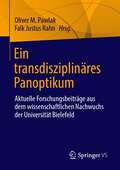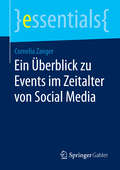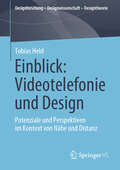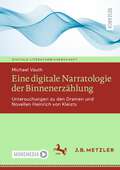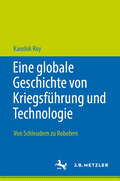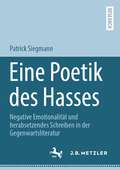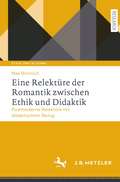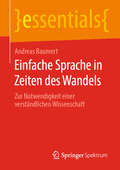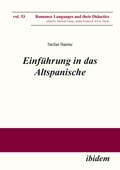- Table View
- List View
Eighteenth-Century Utopian Fiction (Studies In Eighteenth and Nineteenth Century Literature Series)
by Christine ReesUtopian fiction was a particularly rich and important genre during the eighteenth century. It was during this period that a relatively new phenomenon appeared: the merging of utopian writing per se with other fictional genres, such as the increasingly dominant novel. However, while early modern and nineteenth and twentieth century utopias have been the focus of much attention, the eighteenth century has largely been neglected. Utopian Imagination and Eighteenth Century Fiction combines these major areas of interest, interpreting some of the most fascinating and innovative fictions of the period and locating them in a continuing tradition of utopian writing which stretches back through the Renaissance to the Ancient World.Begining with a survey of the recurrent topics in utopian writing - power structures in the state, money, food, sex, the role of women, birth, education and death - the book brings together canonical eighteenth century texts countaining powerful utopian elements, such as Robinson Crusoe, Gulliver's Travels and Rasselas, and less familiar works, to examine the reworking of these topics in a new context. The unfamiliar texts, including Gaudentio di Lucca, are described in detail to give students an idea of relevant material across a broad area. A section is devoted specifically to women writes, an area which has become the focus of attention. The mixture of texts provides a useful cross-reference for students tackling the subject from various perspectives and the comprehensive bibliography provides a valuable tool for those with general or specific interests
Eighteenth-Century Women Playwrights, vol 1
by Derek HughesThis six-volume anthology documents the history of women's drama throughout the 18th century, starting with the emergence in 1695-6 of the second generation of women dramatists to Aphra Benn. It includes the work of Catherine Trotter, Mary Pix, Eliza Haywood and Elizabeth Griffith.
Eighteenth-Century Women Playwrights, vol 2
by Derek HughesThis six-volume anthology documents the history of women's drama throughout the 18th century, starting with the emergence in 1695-6 of the second generation of women dramatists to Aphra Benn. It includes the work of Catherine Trotter, Mary Pix, Eliza Haywood and Elizabeth Griffith.
Eighteenth-Century Women Playwrights, vol 3
by Derek HughesThis six-volume anthology documents the history of women's drama throughout the 18th century, starting with the emergence in 1695-6 of the second generation of women dramatists to Aphra Benn. It includes the work of Catherine Trotter, Mary Pix, Eliza Haywood and Elizabeth Griffith.
Eighteenth-Century Women Playwrights, vol 4
by Derek HughesThis six-volume anthology documents the history of women's drama throughout the 18th century, starting with the emergence in 1695-6 of the second generation of women dramatists to Aphra Benn. It includes the work of Catherine Trotter, Mary Pix, Eliza Haywood and Elizabeth Griffith.
Eighteenth-Century Women Playwrights, vol 5
by Derek HughesThis six-volume anthology documents the history of women's drama throughout the 18th century, starting with the emergence in 1695-6 of the second generation of women dramatists to Aphra Benn. It includes the work of Catherine Trotter, Mary Pix, Eliza Haywood and Elizabeth Griffith.
Eighteenth-Century Women Playwrights, vol 6
by Derek HughesThis six-volume anthology documents the history of women's drama throughout the 18th century, starting with the emergence in 1695-6 of the second generation of women dramatists to Aphra Benn. It includes the work of Catherine Trotter, Mary Pix, Eliza Haywood and Elizabeth Griffith.
Eighteenth-Century Women Poets and Their Poetry: Inventing Agency, Inventing Genre
by Paula R. BackscheiderCo-Winner, James Russell Lowell Prize, Modern Language Association This major study offers a broad view of the writing and careers of eighteenth-century women poets, casting new light on the ways in which poetry was read and enjoyed, on changing poetic tastes in British culture, and on the development of many major poetic genres and traditions. Rather than presenting a chronological survey, Paula R. Backscheider explores the forms in which women wrote and the uses to which they put those forms. Considering more than forty women in relation to canonical male writers of the same era, she concludes that women wrote in all of the genres that men did but often adapted, revised, and even created new poetic kinds from traditional forms.Backscheider demonstrates that knowledge of these women's poetry is necessary for an accurate and nuanced literary history. Within chapters on important canonical and popular verse forms, she gives particular attention to such topics as women's use of religious poetry to express candid ideas about patriarchy and rape; the continuing evolution and important role of the supposedly antiquarian genre of the friendship poetry; same-sex desire in elegy by women as well as by men; and the status of Charlotte Smith as a key figure of the long eighteenth century, not only as a Romantic-era poet.
Eighteenth-Century Women Poets and Their Poetry: Inventing Agency, Inventing Genre
by Paula R. Backscheider“Our sense of eighteenth-century poetic territory is immeasurably expanded by [this] excellent historical and cultural” study of UK women poets of the era (Cynthia Wall, Studies in English Literature).This major work offers a broad view of the writing and careers of eighteenth-century women poets, casting new light on the ways in which poetry was read and enjoyed, on changing poetic tastes in British culture, and on the development of many major poetic genres and traditions.Rather than presenting a chronological survey, Paula R. Backscheider explores the forms in which women wrote and the uses to which they put those forms. Considering more than forty women in relation to canonical male writers of the same era, she concludes that women wrote in all of the genres that men did but often adapted, revised, and even created new poetic kinds from traditional forms.Backscheider demonstrates that knowledge of these women’s poetry is necessary for an accurate and nuanced literary history. Within chapters on important verse forms, she sheds light on such topics as women’s use of religious poetry to express ideas about patriarchy and rape; the important role of friendship poetry; same-sex desire in elegy by women as well as by men; and the status of Charlotte Smith as a key figure of the long eighteenth century, not only as a Romantic-era poet.Co-Winner, James Russell Lowell Prize, Modern Language Association
Eighteenth-Century Women Writers and the Gentleman's Liberation Movement: Independence, War, Masculinity, and the Novel, 1778–1818 (British Literature In Context In The Long Eighteenth Century Ser.)
by Megan A. WoodworthIn the late eighteenth-century English novel, the question of feminism has usually been explored with respect to how women writers treat their heroines and how they engage with contemporary political debates, particularly those relating to the French Revolution. Megan Woodworth argues that women writers' ideas about their own liberty are also present in their treatment of male characters. In positing a 'Gentleman's Liberation Movement,' she suggests that Frances Burney, Charlotte Smith, Jane West, Maria Edgeworth, and Jane Austen all used their creative powers to liberate men from the very institutions and ideas about power, society, and gender that promote the subjection of women. Their writing juxtaposes the role of women in the private spheres with men's engagement in political structures and successive wars for independence (the American Revolution, the French Revolution, and the Napoleonic Wars). The failures associated with fighting these wars and the ideological debates surrounding them made plain, at least to these women writers, that in denying the universality of these natural freedoms, their liberating effects would be severely compromised. Thus, to win the same rights for which men fought, women writers sought to remake men as individuals freed from the tyranny of their patriarchal inheritance.
Eighteenth-Century Women's Writing and the 'Scandalous Memoir'
by Caroline BreashearsThis book contributes to the literary history of eighteenth-century women's life writings, particularly those labeled "scandalous memoirs. " It examines how the evolution of this subgenre was shaped partially by several innovative memoirs that have received only modest critical attention. Breashears argues that Madame de La Touche's Apologie and her friend Lady Vane's Memoirs contributed to the crystallization of this sub-genre at mid-century, and that Lady Vane's collaboration with Tobias Smollett in The Adventures of Peregrine Pickle resulted in a brilliant experiment in the relationship between gender and genre. It demonstrates that the Memoirs of Catherine Jemmat incorporated influential new strategies for self-justification in response to changing kinship priorities, and that Margaret Coghlan's Memoirs introduced revolutionary themes that created a hybrid: the political scandalous memoir. This book will therefore appeal to scholars interested in life writing, women's history, genre theory, and eighteenth-century British literature.
Eighty Years of Archaeology at Liangzhu (Liangzhu Civilization)
by Yefei ZhuThis book summary introduces the key research findings, exploration and excavation works carried out during the 80 years of archaeological endeavours entirely devoted to Liangzhu historical sites. Xingeng SHI first discovered of neolithic remains in 1936, followed along with designation of official name which was given by Nai XIA in 1959. Another perspective also indicates finding of several pieces of black pottery at the Qipanfen historical site in the year 1936 till the latest over 1200 pieces of jades unearthed in Fanshan cemetery in the year 1986. A brief timeline history as listed above has been demonstrated that the great efforts and sacrifices had made by earlier generations of archaeologist in Liangzhu as witness to explore the origin of the 5000 years of Chinese civilization. The public is more familiar with Fanshan cemetery and Liangzhu ancient city as well as precious cultural relics such as jade Cong and jade Yue. Through the 80 years of archaeological ruins of Liangzhu field works that performed, in fact, there are existing historical monuments for example as places of Zhucundou and Wujiabu and ordinary objects include pottery and stoneware, they remain unknown to the general public. This book offers the readers a unique perspective, is the first research to focus on the Liangzhu Archaeological Team members’ viewpoint of exploring the perceived value of an extraordinary experience and compare it with an ordinary experience behind the 80 years of archaeology of the Liangzhu site.
EIL Education for the Expanding Circle: A Japanese Model (Routledge Studies in World Englishes)
by Nobuyuki HinoThe teaching of English in the Expanding Circle, traditionally called EFL countries, has long been regarded as having no choice but to follow Inner Circle or Anglo-American norms, both in pedagogy and language models. This situation is in sharp contrast with that of the Outer Circle, or ESL countries, where the WE (World Englishes) paradigm, coupled with post-colonialism, has liberated the users of indigenous Englishes from the norms of Anglophone native speakers. Employing. Japan as a primary sample, this book proposes a new paradigm of EIL (English as an International Language) education, by integrating relevant paradigms such as WE and ELF (English as a Lingua Franca), which enables users of English from the Expanding Circle to represent their own voices in international communication.. Various examples of actual classroom practice in EIL are also presented, bridging the longstanding gap between theory and practice in this field.
Eileen Chang
by Kam LouieEileen Chang has just been "rediscovered" outside China. But to date, there has been no book written in any language apart from Chinese that analyses her work. As well as being the first such book, the essays collected in here are written by scholars who are all, like Chang, bilingual and bicultural. The approach taken by the contributors in this essay is also multi-disciplinary, with theories and methodologies taken from areas ranging across many areas such literary, gender, historical and film studies. The book therefore should appeal to readers who want to find out more about a China that is beyond political rhetoric, where ordinary human feelings take precedence over concerns about the 'rise of China' and its place in the global village.
Ein neues China-Bild: Wie zeitgenössische chinesische Literatur die Diskussion um China bereichern kann
by Gengsong GaoDieses Buch untersucht die besonderen Beiträge chinesischer Romanautoren zur China-Debatte im Hinblick auf die Schlüsselthemen chinesische Sprache, Machtdynamik und konfuzianische Tradition. Während China auf dem Vormarsch ist, debattieren chinesische Wissenschaftler und politische Entscheidungsträger heftig über Chinas Vergangenheit, Gegenwart und Zukunft. Wer sind die Hauptdiskutanten? Wie analysieren sie die Probleme Chinas und wie finden sie Lösungen? Was sind die wichtigsten Errungenschaften und Schwächen der intellektuellen Debatte und des Diskurses in China? Auch chinesische Romanautoren beteiligen sich an der China-Debatte. Ihre Stimmen sind jedoch selten zu hören. In diesem Buch wird die These vertreten, dass chinesische Romanciers durch die Dramatisierung der Vielfalt der Alltagssprachen, der aktiven diskursiven Praktiken und der bezaubernden lokalen Traditionen nicht nur die vorherrschenden liberalen,neulinken und neokonfuzianischen Ideologien illustrieren, sondern die China-Debatte bereichern und einen "neuartigen" Ansatz für unser Verständnis des modernen China bieten.
Ein transdisziplinäres Panoptikum: Aktuelle Forschungsbeiträge aus dem wissenschaftlichen Nachwuchs der Universität Bielefeld
by Oliver M. Pawlak Falk Justus RahnDer Band versammelt zugänglich und kompakt eine Auswahl an Forschungsprojekten aus dem wissenschaftlichen Nachwuchs der Universität Bielefeld, die im Kontext eines Kongressformats zusammengekommen sind. Die Themen dieses Bandes sind aufgrund des transdisziplinären Ansatzes vielfältig: Von Genderrollen in Slasher-Filmen über moralischen Umgang mit Pflanzen bis hin zur Reproduktion von Straftäterinnen und Straftätern durch den Jugendvollzug ‒ entscheidendes Kriterium der peer-reviewed Beiträge war neben der fachlichen Qualität, den Inhalt für ein neugieriges Publikum lesefreundlich aufzubereiten.
Ein Überblick zu Events im Zeitalter von Social Media (essentials)
by Cornelia ZangerDie explosionsartige Entwicklung der digitalen Vernetzung hat auch dieKommunikationspolitik von Unternehmen verändert. Social-Media-Kommunikation beeinflusst das Eventmarketing und bietet ein großes Potenzial für die Verbindung von multisensualen Erlebnissen mit einer Erhöhung der Reichweite von Events. Nach dem Grad der Intensität der Verbindung von realen Events und Social Media sind verschiedene Eventtypen zu ermitteln. Im Beitrag werden sowohl virtuelle Events im engeren Sinne als auch sogenannte hybride Events, bei denen reale Events mit Social-Media-Elementen verbunden sind, betrachtet.
Einblick: Potenziale und Perspektiven im Kontext von Nähe und Distanz (Designforschung – Designwissenschaft - Designtheorie)
by Tobias HeldDer Band beschäftigt sich mit der Erforschung sozio-interaktiver Potentiale der Videotelefonie im Kontext von Nähe und Verbundenheit mit Fokus auf dem Eigenbild sowie dem Rederechtswechsel. Die Videotelefonie als Kommunikationsform hat sich – und darauf deuten die Erfahrungen der Covid-19-Pandemie hin – im lebensweltlichen Alltag der Menschen etabliert und wird dort in naher Zukunft nicht mehr wegzudenken sein. Auf Basis ihrer Möglichkeiten und Errungenschaften ist es inzwischen Realität und Lebenswirklichkeit, dass die Kommunikation sowohl im privaten als auch im geschäftlichen Kontext mittels verschiedenster Kanäle stattfindet. Der Videotelefonie kommt hierbei als solche nicht nur eine tragende Funktion, sondern auch eine herausragende Rolle bei der vermeintlichen Reproduktion der Face-to-Face-Kommunikation im digitalen Raum zu und wird wie selbstverständlich zum zwischenmenschlichen Austausch genutzt. Just an diesem Punkt knüpft die Forschungsarbeit an. Zentral stand dabei das Vorhaben einer dezidierte Untersuchung des Forschungsgegenstandes Videotelefonie, sowohl aus Kultur- als auch Technikhistorischer, aber auch Medien-, Wahrnehmungs- wie Kommunikations- theoretischer Perspektive, indem analytische und phänosemiotische Perspektiven miteinander in Beziehung gesetzt werden (z.B. Wahrnehmungsbedingungen, Interaktionsmerkmale, realisierte Kommunikationsprozesse etc.). Die Arbeit ist damit vor allem im Bereich des Produkt- und Interactiondesigns zu verorten, adressiert jedoch auch Motive der Medien- und Wahrnehmungstheorie. Darüber hinaus hat sie das Ziel der Darlegung und Begründung der Videotelefonie als eigenständige Kommunikationsform, welche durch eigene, kommunikative Besonderheiten, die sich in ihrer jeweiligen Ingebrauchnahme sowie durch spezielle Wahrnehmungsbedingungen äußern, und die die Videotelefonie als »Rederechtswechselmedium« avant la lettre konsolidieren, gekennzeichnet ist. Dabei soll der Beweis erbracht werden, dass die Videotelefonie nicht als Schwundstufe einer Kommunikation Face-to-Face, sondern als ein eigenständiges Mediatisierungs- und Kommunikationsereignis zu verstehen sei. Und eben nicht als eine beliebige – sich linear vom Telefon ausgehende – entwickelte Form der audio-visuellen Fernkommunikation darstellt, sondern die gestalterische (Bewegtbild-)Technizität ein eigenständiges Funktionsmaß offeriert, welches wiederum ein innovatives Kommunikationsmilieu im Kontext einer Rederechtswechsel-Medialität stabilisiert.
Eine digitale Narratologie der Binnenerzählung: Untersuchungen zu den Dramen und Novellen Heinrich von Kleists (Digitale Literaturwissenschaft)
by Michael VauthDie vorliegende Studie operationalisiert eines der meistdiskutierten Konzepte der Narratologie für die digitale Annotation von Erzähltexten: Binnenerzählungen. Anhand des erzählerischen und dramatischen Werks Heinrich von Kleists werden Annotationsschemata für narrative Redewiedergabe und Verfahren der computationellen Annotationsauswertung entwickelt. Das Ergebnis ist ein neues Konzept der Binnenerzählung, das auch Mikrophänomene des Erzählens in der Figurenkommunikation erfasst und transgenerisch eingesetzt werden kann. Am Beispiel von Kleist längeren Novellen und Dramen wird der Nutzen dieses Konzept vorgeführt, indem vor allem mit Verfahren der literaturwissenschaftlichen Netzwerkanalysen die zahlreichen Mikrophänome des Erzählens makroanalytisch untersucht werden.
Eine globale Geschichte von Kriegsführung und Technologie: Von Schleudern zu Robotern
by Kaushik RoyDieses Buch behandelt die globale Geschichte von Technologie, Kriegsführung und Staatenbildung vom Steinzeitalter bis zum Informationszeitalter. Unter Verwendung einer Kombination von Top-Down- und Bottom-Up-Methoden untersucht es sowohl zwischenstaatliche als auch innerstaatliche Konflikte mit einem Schwerpunkt auf eurasischer Technologie und Kriegsführung. Es zeigt, wie menschliches Handeln und strukturelle Faktoren miteinander verflochten sind und ein komplexes Geflecht von Technologie und Kriegsführung schaffen. Es erforscht auch das Zusammenspiel zwischen technologischen und nicht-technologischen Faktoren, um die Entwicklung der Kriegsführung von ihren Anfängen bis heute zu veranschaulichen, und argumentiert, dass die Interaktionen zwischen zivilen und militärischen Sektoren den Einsatz von Technologie in der Kriegsführung geprägt haben. Aufgrund ihres Umfangs und ihrer Tiefe ist es eine wertvolle Ressource für Forscher in Bereichen wie Weltgeschichte, Geschichte von Wissenschaft und Technologie, Geschichte von Kriegsführung und Imperialismus sowie Internationale Beziehungen.
Eine Poetik des Hasses: Negative Emotionalität und herabsetzendes Schreiben in der Gegenwartsliteratur
by Patrick SiegmannIn seiner Studie analysiert Patrick Siegmann das Schreiben von Elfriede Jelinek, Thomas Bernhard und Rainald Goetz, in welchem eine fortdauernde Auseinandersetzung mit dem Hass auf verschiedene Weisen thematisiert wird. Dabei widmet er sich der Erschließung einer Poetik des Hasses, die sich gegen Kategorien wie Heimat und Familie richtet und welche der Aufarbeitung der nationalsozialistischen Vergangenheit sowie der deutschen Identität dient. Die für die kultur- und literaturwissenschaftliche Untersuchung des Hasses gewinnbringenden Primäranalysen fokussieren einen Textkorpus aus Romanen, Kurztexten und Theaterstücken der Autor:innen.
Eine Relektüre der Romantik zwischen Ethik und Didaktik: Postmoderne Relektüre mit didaktischem Bezug (Ethik und Bildung)
by Max BrinnichAn der Schnittstelle zwischen Philosophie, Literatur, Ethik und Ästhetik liegt in derphilosophischen Fach- und Literaturdidaktik ein nicht ausgeschöpftes Potential begraben –insbesondere im Umgang mit der literarischen Romantik. Diesem Potential spürt dievorliegende Arbeit nach, indem sie Schlegels „Lucinde“, Eichendorffs „Taugenichts“ undHoffmanns „Sandmann“ einer kritischen Relektüre unterzieht, um die in der philosophischenPostmoderne viel diskutierten Übergänge zwischen Ethik und Ästhetik sichtbar zu machenund ihre Bedeutung für die Fachdidaktik zu diskutieren.
Einfache Sprache in Zeiten des Wandels: Zur Notwendigkeit einer verständlichen Wissenschaft (essentials)
by Andreas BaumertWas derzeit als Klimakatastrophe diskutiert wird, scheint nicht die einzige Bedrohung, der wir gegenüberstehen. Wissenschaften berichten ergänzend über den fatalen Umgang mit natürlichen Ressourcen und weitere Gefahren sozialer und politischer Art. Einiges spricht dafür, dass wir eine Situation erreichen, in der verständliche wissenschaftliche Expertise überlebensnotwendig wird. Zumindest theoretisch sind Demokratien als offene Gesellschaften imstande, auf diesen Rat zu reagieren. Sie müssen dazu einige Störfeuer abwehren, die auf den uninformierten Bürger setzen. Wissenschaftliche Erkenntnis, präsentiert in einer einfachen Sprache, kann dabei helfen. Das essential diskutiert dazu einige populärwissenschaftliche Veröffentlichungen und schaut auf den immerwährenden Kampf des Neuen in der Wissenschaft gegen eine verkarstete Gesellschaft. Mit welchen schwerwiegenden Veränderungen wir rechnen müssen, zeigen Arbeiten des Wuppertaler Instituts. Wenn wir diese Transformation der Gesellschaft nicht in Angriff nehmen, werden die Konsequenzen sehr wahrscheinlich fatal sein.
Einführung in das Altspanische
by Stefan BarmeThis introduction to Medieval Spanish, or Old Spanish, closes a long-standing gap in the literature. Focusing on the internal history of the Spanish language, it traces its phonetic, grammatical, and lexical development from classical and vulgar Latin to Medieval Spanish. The characteristics of the Old Spanish language are also illustrated through a presentation and commentary of suitable text excerpts that represent its different stages of development.
Einführung in das Altspanische (Romance Languages and Their Didactics #53)
by Stefan BarmeThis introduction to Medieval Spanish, or Old Spanish, closes a long-standing gap in the literature. Focusing on the internal history of the Spanish language, it traces its phonetic, grammatical, and lexical development from classical and vulgar Latin to Medieval Spanish. The characteristics of the Old Spanish language are also illustrated through a presentation and commentary of suitable text excerpts that represent its different stages of development.
